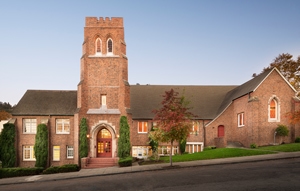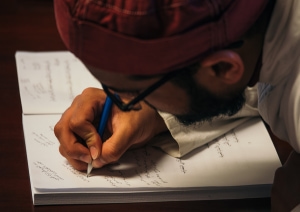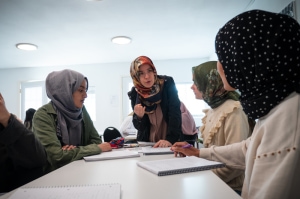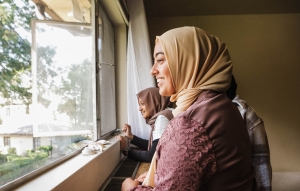“We need to frame the discussion.”
Zaytuna MA student Scott Doolin discusses his path to a PhD program

Zaytuna MA student Scott Doolin, who is preparing to graduate in May, sat down with Faisal Hamid, our director of admissions, to reflect on his time at the College. Their conversation, edited for clarity and length, is transcribed below. Learn more about the MA in Islamic texts.
Scott had the unique experience of earning a Zaytuna bachelor’s degree in Islamic law and theology before pursuing his MA here. After six years engaged with classical and modern texts in the Islamic and Western traditions, he is convinced the grounding he acquired in both traditions is deeply related to contemporary discussions—especially in his areas of interest: philosophy and ethics.
Faisal Hamid: What was your background before you became an MA candidate?
Scott Doolin: I graduated from Zaytuna’s BA program right before starting the MA. Some years before Zaytuna, I studied philosophy at Evergreen State College in Washington.
FH: Why did you choose Zaytuna College’s MA program?
SD: I had been through the undergraduate program, so I understood the rigor and the integrity of the education. The master’s program is incredibly intentional with regard to what is studied, and I knew that intentionality would help me direct my studies. The faculty here are a set of incredible individuals, each of whom has something unique to offer. Some have spent their entire lives immersed in the traditional study of Islam. Others have a background in traditional study as well as the academic study of Islam. The faculty have skills that allow them to bridge the gap between the traditional and the academic study of Islam.
FH: What’s your track, and what’s your area of research for your thesis?
SD: I chose the Islamic philosophy and theology track. Islamic philosophy is my particular area of interest. My thesis looks at Avicenna [Ibn Sina] and his conception and understanding of the transcendental concepts. I’m exploring how Avicenna approaches questions of being, truth, and goodness, and how these concepts fit into his philosophical system. My sense is that there’s something in his body of philosophical work that may help us frame or even answer some of contemporary philosophy’s questions.
FH: What were your goals when entering the MA program?
SD: My long-term goal is professorship, so I planned to enter a PhD program after the MA. I knew the MA would help prepare me for that goal—that is, not just in terms of understanding just the Arabic language itself but also of understanding the mind and world of the authors and the thinkers with whom we interact. Because we’re studying these things as a living tradition, we’re able to engage with the intentions that ground the text. We’re also taught to develop and cultivate the skills necessary for the type of rigorous academic work I will need to achieve my goal of becoming a professor. I believe the Muslim intellectual community needs to be firmly and fully engaged with the academic world. We need to be producing. We need to be writing. We need to be doing research. We need to be framing the discussion. We need to be articulating the questions from inside the tradition in a way that allows us to converse with those within academia. And so, entering a PhD program is an incredibly important endeavor for those of us who enjoy this struggle that is academic research, academic production, and academic engagement.
FH: Alhamdulillah, you have received admissions into a PhD program. Can you share which PhD program, and what your research focus will be?
SD: God willing, I will be entering into the Divinity School at the University of Chicago, in their Islamic Studies Department. I’m really excited for this. It’s one of the highest-rated divinity schools in the country, or in the world. So it’s a great blessing. There are some incredible figures there with whom I’m excited to work.
In terms of my research interest, I’m interested in Islamic philosophy, Avicenna’s influence in both the Muslim and Western world, theistic metaphysics, ethics, and philology.
FH: How did the Zaytuna MA program help you gain acceptance at the University of Chicago?
SD: It helped me in a number of ways. The most important of these is the level of Arabic that I’ve been able to develop during my time in the Zaytuna MA program. Not only can I read the text fluently, but I can understand the text. I know the terminology that is being used. No matter how well you know modern standard Arabic, you’re not going to understand the nuances of the terminology used in classical Islamic texts unless you’re intimately engaged with those texts throughout your study of the Arabic language. Another benefit of the Zaytuna approach is that because we work so closely with this genre of texts, you learn to intuit the matters being discussed, even when confronted with new material.
Another way this program helped me in my acceptance is that, unlike some traditional Islamic studies seminaries, at Zaytuna we read secondary sources. So, we’re aware of the conversations that are going on in contemporary Islamic studies in academia. We’re not divorced from that; it’s not something alien to us. When we produce the work that we produce, we’re addressing those questions. The connections I made through my teachers here was also so beneficial. One of them graduated from the same program I was accepted into. My teacher consistently reached out and talked to professors there. The care and concern they showed in helping me, in assisting me to get this acceptance, was immense. The MA program gives you a level of mastery in the field of your choice that I think is very appealing to faculty and admissions committees at universities.
FH: Was Zaytuna’s financial aid policy a consideration when choosing an MA program?
SD: Absolutely. I knew that finances would not be a problem for me because of the generosity of the financial aid packages and the generosity of the donors.
FH: Based on your experience, what sorts of applicants would you recommend apply for the Zaytuna MA program?
SD: I believe that the Zaytuna MA program is tailored to allow for a diversity of applicants. For those who are passionate about higher levels of academic research in Islamic studies, this is a perfect program. Of course, students must be capable of handling the rigor of the program. But if they’re capable of doing so, out of love and a great desire to flourish intellectually, both for themselves and for their community, this is for them. It is for people who understand that the tradition and the classical approach to philosophical and legal questions are not dead, they’re living. But they can only live if we engage in them and bring them into the light of day.



